Intercultural Communication and Negotiation Skills: A Detailed Report
VerifiedAdded on 2023/03/17
|10
|2977
|73
Report
AI Summary
This report provides an analytical reflection on intercultural communication and negotiation skills, crucial for modern business environments. It examines the usefulness, situational analysis, and organizational impact of each topic. Intercultural communication is defined as communication between individuals from different cultural backgrounds, while negotiation skills and conflict management involve resolving workplace issues. The report discusses how these skills enhance communication, facilitate international business, and improve conflict resolution. It highlights the importance of adapting to cultural differences, developing negotiation strategies, and fostering a positive work environment to achieve organizational objectives. The report also explores the impact of these skills on individual thinking and future business roles, emphasizing their significance in a globalized economy. The student reflects on how learning these skills has transformed their understanding of business practices and enhanced their ability to manage teams and projects effectively.
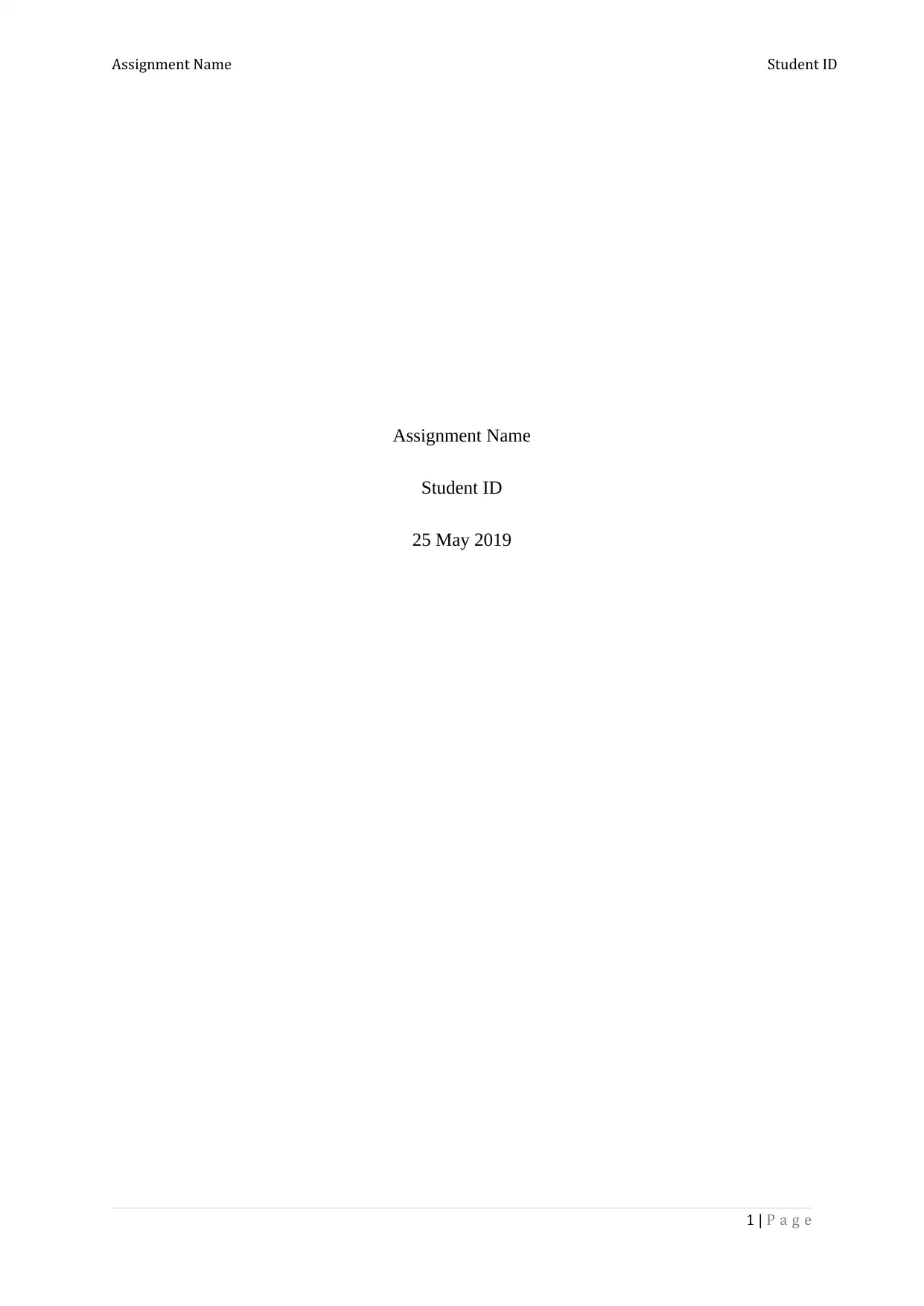
Assignment Name Student ID
Assignment Name
Student ID
25 May 2019
1 | P a g e
Assignment Name
Student ID
25 May 2019
1 | P a g e
Paraphrase This Document
Need a fresh take? Get an instant paraphrase of this document with our AI Paraphraser
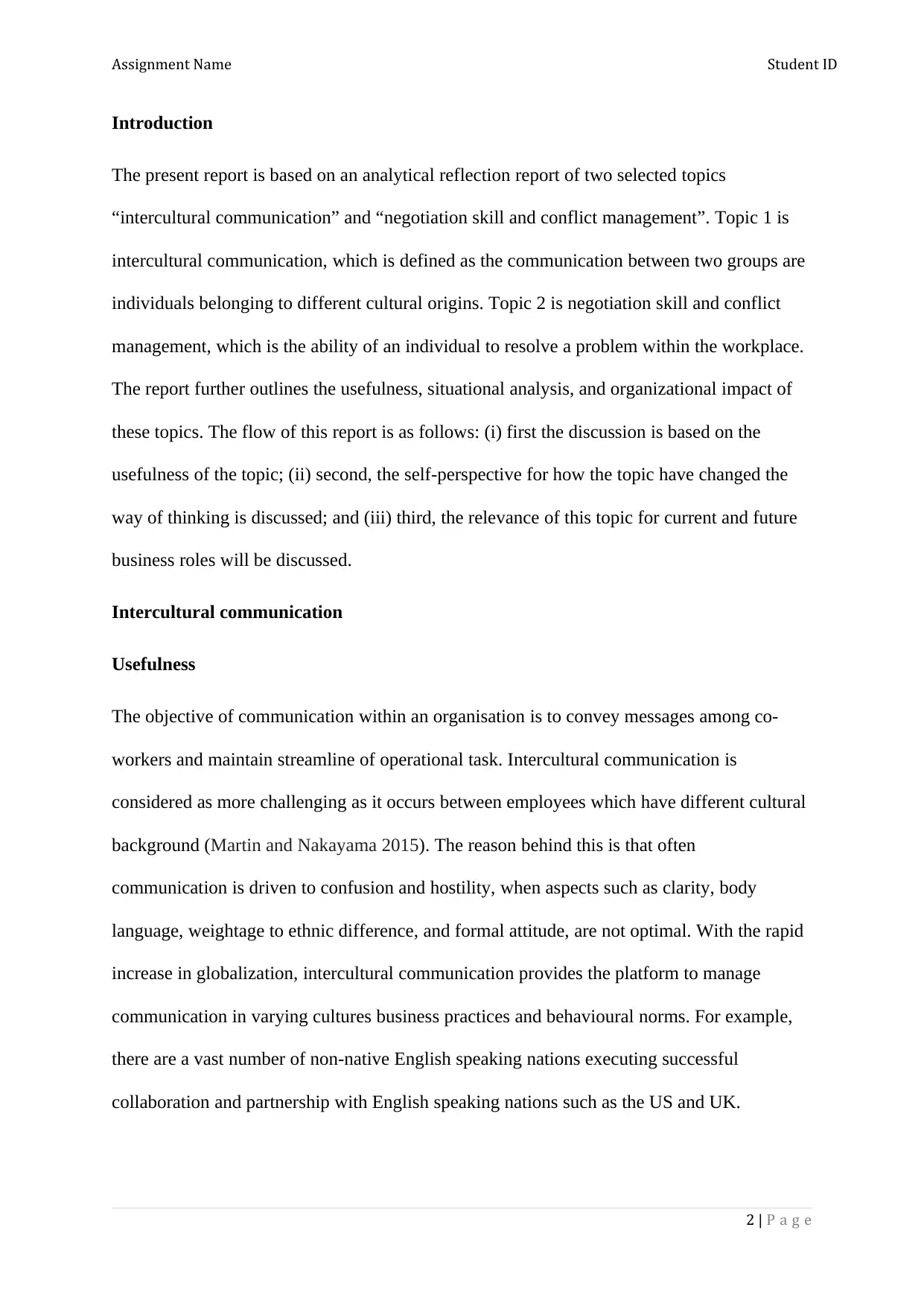
Assignment Name Student ID
Introduction
The present report is based on an analytical reflection report of two selected topics
“intercultural communication” and “negotiation skill and conflict management”. Topic 1 is
intercultural communication, which is defined as the communication between two groups are
individuals belonging to different cultural origins. Topic 2 is negotiation skill and conflict
management, which is the ability of an individual to resolve a problem within the workplace.
The report further outlines the usefulness, situational analysis, and organizational impact of
these topics. The flow of this report is as follows: (i) first the discussion is based on the
usefulness of the topic; (ii) second, the self-perspective for how the topic have changed the
way of thinking is discussed; and (iii) third, the relevance of this topic for current and future
business roles will be discussed.
Intercultural communication
Usefulness
The objective of communication within an organisation is to convey messages among co-
workers and maintain streamline of operational task. Intercultural communication is
considered as more challenging as it occurs between employees which have different cultural
background (Martin and Nakayama 2015). The reason behind this is that often
communication is driven to confusion and hostility, when aspects such as clarity, body
language, weightage to ethnic difference, and formal attitude, are not optimal. With the rapid
increase in globalization, intercultural communication provides the platform to manage
communication in varying cultures business practices and behavioural norms. For example,
there are a vast number of non-native English speaking nations executing successful
collaboration and partnership with English speaking nations such as the US and UK.
2 | P a g e
Introduction
The present report is based on an analytical reflection report of two selected topics
“intercultural communication” and “negotiation skill and conflict management”. Topic 1 is
intercultural communication, which is defined as the communication between two groups are
individuals belonging to different cultural origins. Topic 2 is negotiation skill and conflict
management, which is the ability of an individual to resolve a problem within the workplace.
The report further outlines the usefulness, situational analysis, and organizational impact of
these topics. The flow of this report is as follows: (i) first the discussion is based on the
usefulness of the topic; (ii) second, the self-perspective for how the topic have changed the
way of thinking is discussed; and (iii) third, the relevance of this topic for current and future
business roles will be discussed.
Intercultural communication
Usefulness
The objective of communication within an organisation is to convey messages among co-
workers and maintain streamline of operational task. Intercultural communication is
considered as more challenging as it occurs between employees which have different cultural
background (Martin and Nakayama 2015). The reason behind this is that often
communication is driven to confusion and hostility, when aspects such as clarity, body
language, weightage to ethnic difference, and formal attitude, are not optimal. With the rapid
increase in globalization, intercultural communication provides the platform to manage
communication in varying cultures business practices and behavioural norms. For example,
there are a vast number of non-native English speaking nations executing successful
collaboration and partnership with English speaking nations such as the US and UK.
2 | P a g e
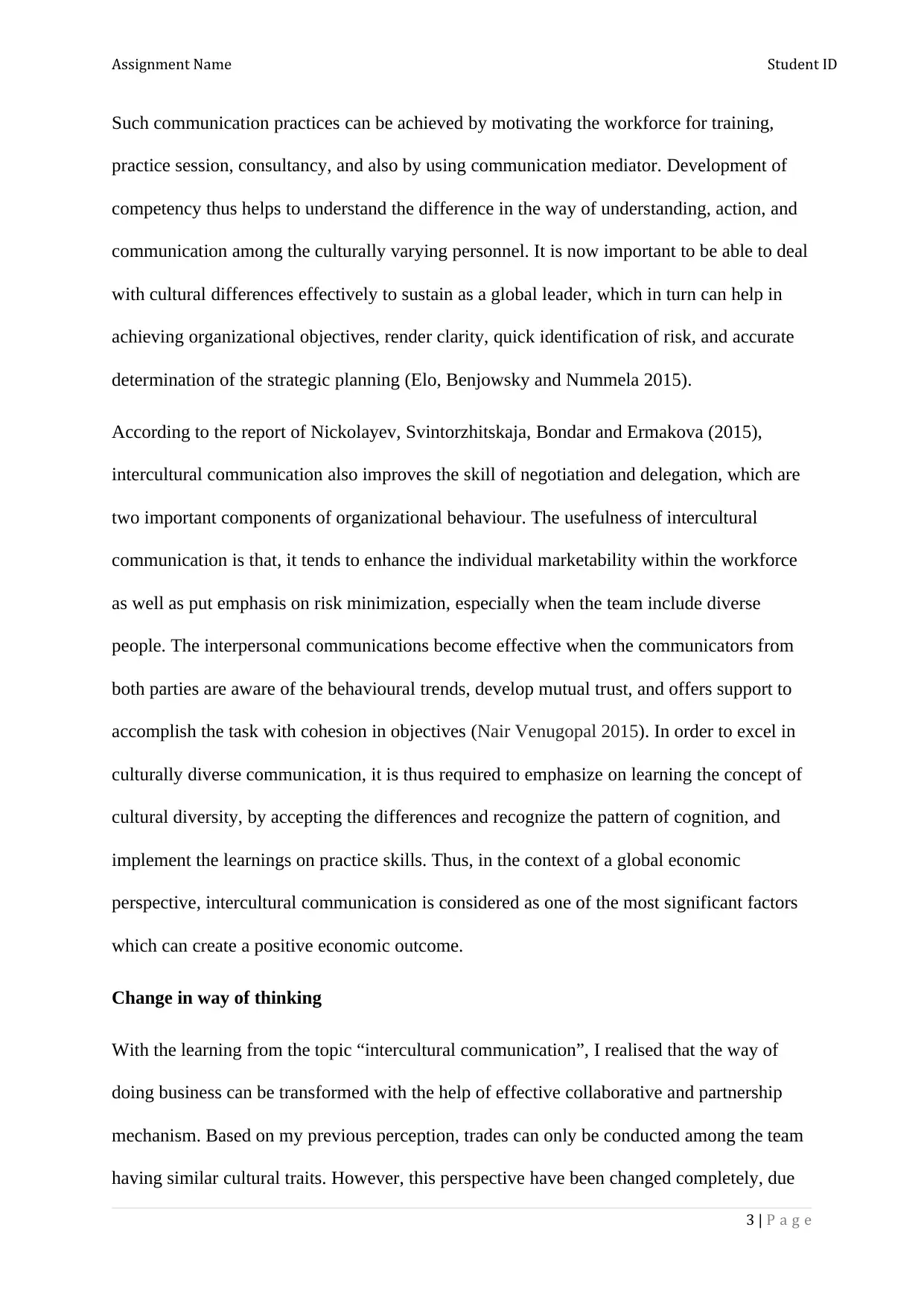
Assignment Name Student ID
Such communication practices can be achieved by motivating the workforce for training,
practice session, consultancy, and also by using communication mediator. Development of
competency thus helps to understand the difference in the way of understanding, action, and
communication among the culturally varying personnel. It is now important to be able to deal
with cultural differences effectively to sustain as a global leader, which in turn can help in
achieving organizational objectives, render clarity, quick identification of risk, and accurate
determination of the strategic planning (Elo, Benjowsky and Nummela 2015).
According to the report of Nickolayev, Svintorzhitskaja, Bondar and Ermakova (2015),
intercultural communication also improves the skill of negotiation and delegation, which are
two important components of organizational behaviour. The usefulness of intercultural
communication is that, it tends to enhance the individual marketability within the workforce
as well as put emphasis on risk minimization, especially when the team include diverse
people. The interpersonal communications become effective when the communicators from
both parties are aware of the behavioural trends, develop mutual trust, and offers support to
accomplish the task with cohesion in objectives (Nair Venugopal 2015). In order to excel in
culturally diverse communication, it is thus required to emphasize on learning the concept of
cultural diversity, by accepting the differences and recognize the pattern of cognition, and
implement the learnings on practice skills. Thus, in the context of a global economic
perspective, intercultural communication is considered as one of the most significant factors
which can create a positive economic outcome.
Change in way of thinking
With the learning from the topic “intercultural communication”, I realised that the way of
doing business can be transformed with the help of effective collaborative and partnership
mechanism. Based on my previous perception, trades can only be conducted among the team
having similar cultural traits. However, this perspective have been changed completely, due
3 | P a g e
Such communication practices can be achieved by motivating the workforce for training,
practice session, consultancy, and also by using communication mediator. Development of
competency thus helps to understand the difference in the way of understanding, action, and
communication among the culturally varying personnel. It is now important to be able to deal
with cultural differences effectively to sustain as a global leader, which in turn can help in
achieving organizational objectives, render clarity, quick identification of risk, and accurate
determination of the strategic planning (Elo, Benjowsky and Nummela 2015).
According to the report of Nickolayev, Svintorzhitskaja, Bondar and Ermakova (2015),
intercultural communication also improves the skill of negotiation and delegation, which are
two important components of organizational behaviour. The usefulness of intercultural
communication is that, it tends to enhance the individual marketability within the workforce
as well as put emphasis on risk minimization, especially when the team include diverse
people. The interpersonal communications become effective when the communicators from
both parties are aware of the behavioural trends, develop mutual trust, and offers support to
accomplish the task with cohesion in objectives (Nair Venugopal 2015). In order to excel in
culturally diverse communication, it is thus required to emphasize on learning the concept of
cultural diversity, by accepting the differences and recognize the pattern of cognition, and
implement the learnings on practice skills. Thus, in the context of a global economic
perspective, intercultural communication is considered as one of the most significant factors
which can create a positive economic outcome.
Change in way of thinking
With the learning from the topic “intercultural communication”, I realised that the way of
doing business can be transformed with the help of effective collaborative and partnership
mechanism. Based on my previous perception, trades can only be conducted among the team
having similar cultural traits. However, this perspective have been changed completely, due
3 | P a g e
⊘ This is a preview!⊘
Do you want full access?
Subscribe today to unlock all pages.

Trusted by 1+ million students worldwide
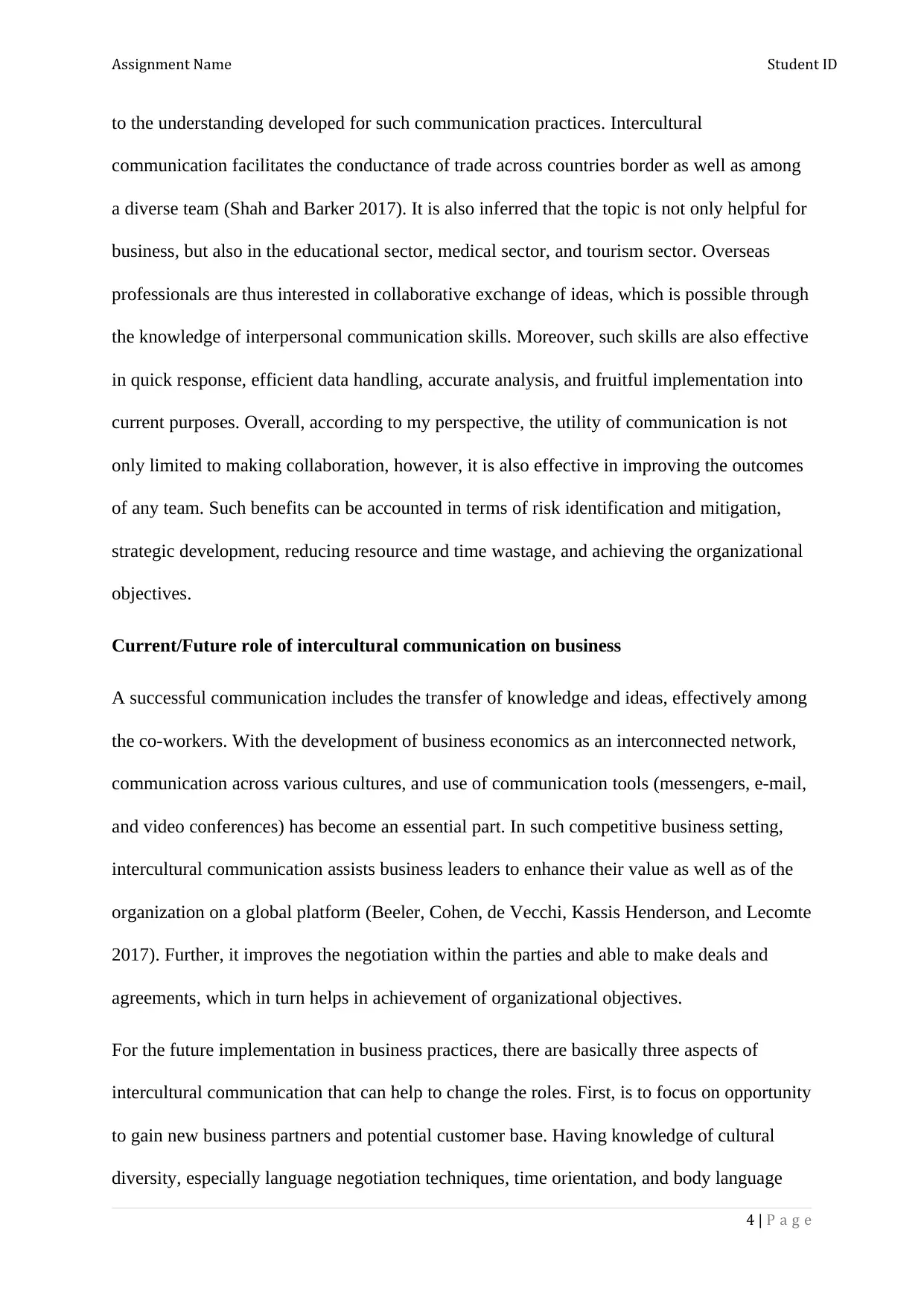
Assignment Name Student ID
to the understanding developed for such communication practices. Intercultural
communication facilitates the conductance of trade across countries border as well as among
a diverse team (Shah and Barker 2017). It is also inferred that the topic is not only helpful for
business, but also in the educational sector, medical sector, and tourism sector. Overseas
professionals are thus interested in collaborative exchange of ideas, which is possible through
the knowledge of interpersonal communication skills. Moreover, such skills are also effective
in quick response, efficient data handling, accurate analysis, and fruitful implementation into
current purposes. Overall, according to my perspective, the utility of communication is not
only limited to making collaboration, however, it is also effective in improving the outcomes
of any team. Such benefits can be accounted in terms of risk identification and mitigation,
strategic development, reducing resource and time wastage, and achieving the organizational
objectives.
Current/Future role of intercultural communication on business
A successful communication includes the transfer of knowledge and ideas, effectively among
the co-workers. With the development of business economics as an interconnected network,
communication across various cultures, and use of communication tools (messengers, e-mail,
and video conferences) has become an essential part. In such competitive business setting,
intercultural communication assists business leaders to enhance their value as well as of the
organization on a global platform (Beeler, Cohen, de Vecchi, Kassis Henderson, and Lecomte
2017). Further, it improves the negotiation within the parties and able to make deals and
agreements, which in turn helps in achievement of organizational objectives.
For the future implementation in business practices, there are basically three aspects of
intercultural communication that can help to change the roles. First, is to focus on opportunity
to gain new business partners and potential customer base. Having knowledge of cultural
diversity, especially language negotiation techniques, time orientation, and body language
4 | P a g e
to the understanding developed for such communication practices. Intercultural
communication facilitates the conductance of trade across countries border as well as among
a diverse team (Shah and Barker 2017). It is also inferred that the topic is not only helpful for
business, but also in the educational sector, medical sector, and tourism sector. Overseas
professionals are thus interested in collaborative exchange of ideas, which is possible through
the knowledge of interpersonal communication skills. Moreover, such skills are also effective
in quick response, efficient data handling, accurate analysis, and fruitful implementation into
current purposes. Overall, according to my perspective, the utility of communication is not
only limited to making collaboration, however, it is also effective in improving the outcomes
of any team. Such benefits can be accounted in terms of risk identification and mitigation,
strategic development, reducing resource and time wastage, and achieving the organizational
objectives.
Current/Future role of intercultural communication on business
A successful communication includes the transfer of knowledge and ideas, effectively among
the co-workers. With the development of business economics as an interconnected network,
communication across various cultures, and use of communication tools (messengers, e-mail,
and video conferences) has become an essential part. In such competitive business setting,
intercultural communication assists business leaders to enhance their value as well as of the
organization on a global platform (Beeler, Cohen, de Vecchi, Kassis Henderson, and Lecomte
2017). Further, it improves the negotiation within the parties and able to make deals and
agreements, which in turn helps in achievement of organizational objectives.
For the future implementation in business practices, there are basically three aspects of
intercultural communication that can help to change the roles. First, is to focus on opportunity
to gain new business partners and potential customer base. Having knowledge of cultural
diversity, especially language negotiation techniques, time orientation, and body language
4 | P a g e
Paraphrase This Document
Need a fresh take? Get an instant paraphrase of this document with our AI Paraphraser
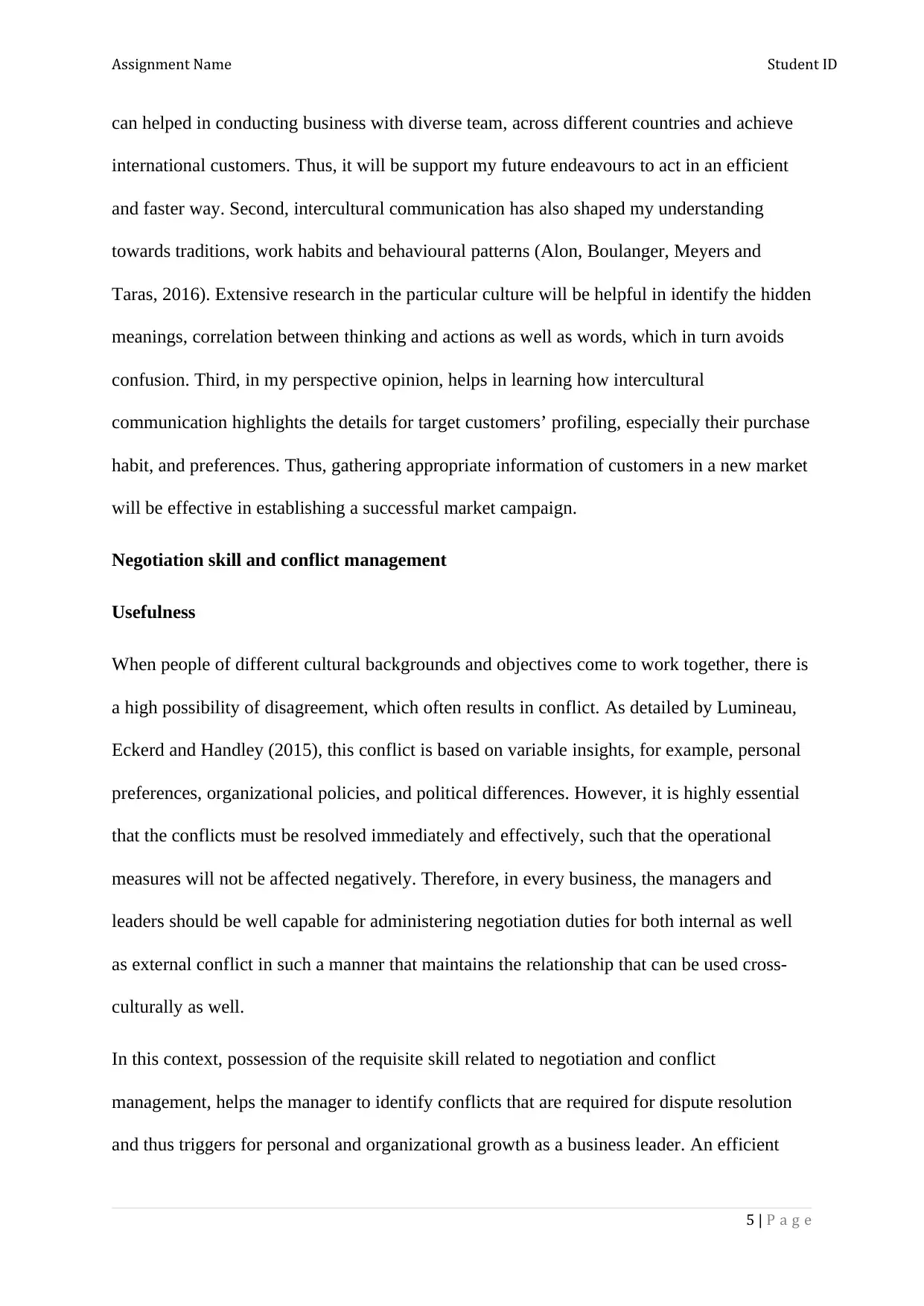
Assignment Name Student ID
can helped in conducting business with diverse team, across different countries and achieve
international customers. Thus, it will be support my future endeavours to act in an efficient
and faster way. Second, intercultural communication has also shaped my understanding
towards traditions, work habits and behavioural patterns (Alon, Boulanger, Meyers and
Taras, 2016). Extensive research in the particular culture will be helpful in identify the hidden
meanings, correlation between thinking and actions as well as words, which in turn avoids
confusion. Third, in my perspective opinion, helps in learning how intercultural
communication highlights the details for target customers’ profiling, especially their purchase
habit, and preferences. Thus, gathering appropriate information of customers in a new market
will be effective in establishing a successful market campaign.
Negotiation skill and conflict management
Usefulness
When people of different cultural backgrounds and objectives come to work together, there is
a high possibility of disagreement, which often results in conflict. As detailed by Lumineau,
Eckerd and Handley (2015), this conflict is based on variable insights, for example, personal
preferences, organizational policies, and political differences. However, it is highly essential
that the conflicts must be resolved immediately and effectively, such that the operational
measures will not be affected negatively. Therefore, in every business, the managers and
leaders should be well capable for administering negotiation duties for both internal as well
as external conflict in such a manner that maintains the relationship that can be used cross-
culturally as well.
In this context, possession of the requisite skill related to negotiation and conflict
management, helps the manager to identify conflicts that are required for dispute resolution
and thus triggers for personal and organizational growth as a business leader. An efficient
5 | P a g e
can helped in conducting business with diverse team, across different countries and achieve
international customers. Thus, it will be support my future endeavours to act in an efficient
and faster way. Second, intercultural communication has also shaped my understanding
towards traditions, work habits and behavioural patterns (Alon, Boulanger, Meyers and
Taras, 2016). Extensive research in the particular culture will be helpful in identify the hidden
meanings, correlation between thinking and actions as well as words, which in turn avoids
confusion. Third, in my perspective opinion, helps in learning how intercultural
communication highlights the details for target customers’ profiling, especially their purchase
habit, and preferences. Thus, gathering appropriate information of customers in a new market
will be effective in establishing a successful market campaign.
Negotiation skill and conflict management
Usefulness
When people of different cultural backgrounds and objectives come to work together, there is
a high possibility of disagreement, which often results in conflict. As detailed by Lumineau,
Eckerd and Handley (2015), this conflict is based on variable insights, for example, personal
preferences, organizational policies, and political differences. However, it is highly essential
that the conflicts must be resolved immediately and effectively, such that the operational
measures will not be affected negatively. Therefore, in every business, the managers and
leaders should be well capable for administering negotiation duties for both internal as well
as external conflict in such a manner that maintains the relationship that can be used cross-
culturally as well.
In this context, possession of the requisite skill related to negotiation and conflict
management, helps the manager to identify conflicts that are required for dispute resolution
and thus triggers for personal and organizational growth as a business leader. An efficient
5 | P a g e
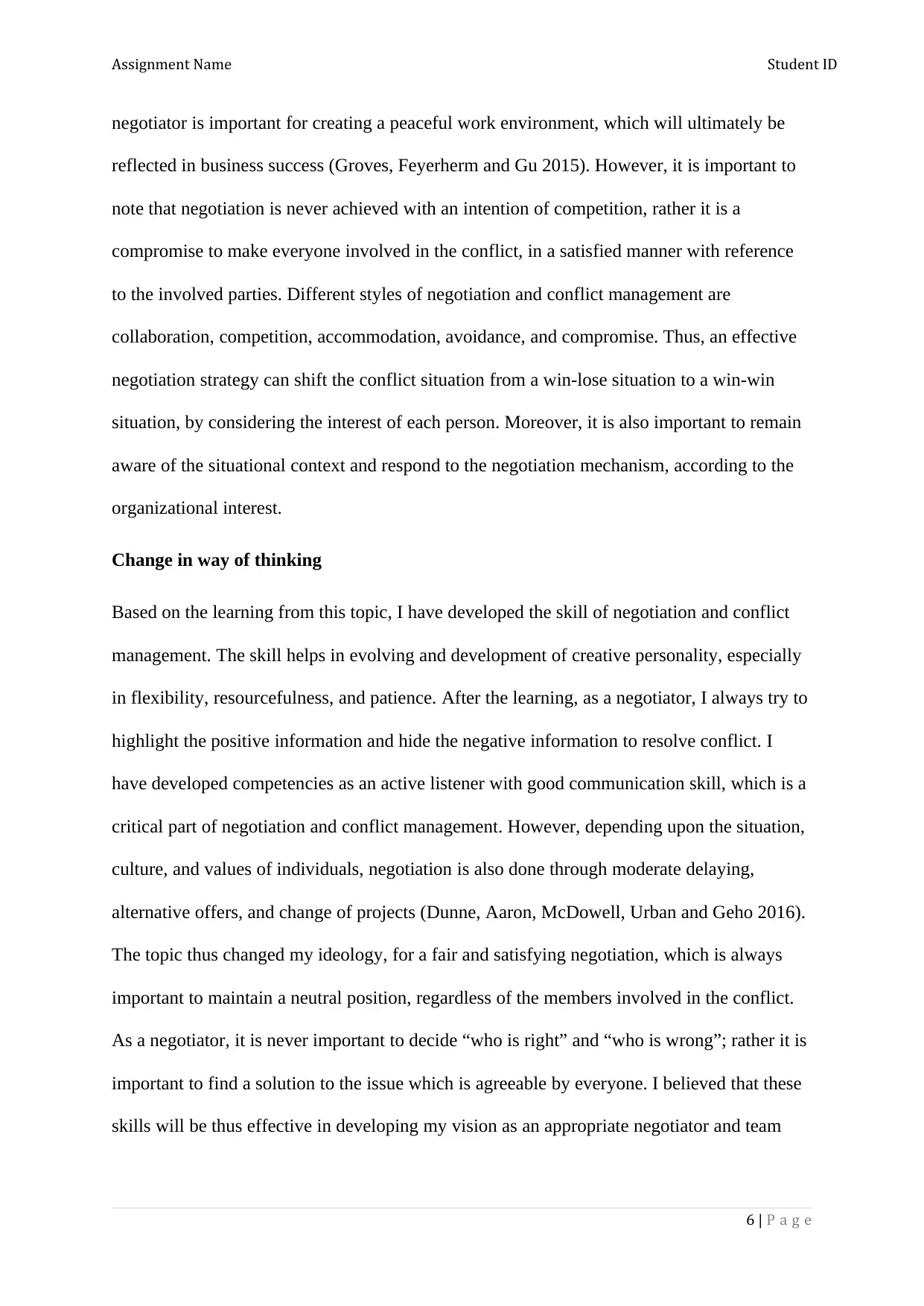
Assignment Name Student ID
negotiator is important for creating a peaceful work environment, which will ultimately be
reflected in business success (Groves, Feyerherm and Gu 2015). However, it is important to
note that negotiation is never achieved with an intention of competition, rather it is a
compromise to make everyone involved in the conflict, in a satisfied manner with reference
to the involved parties. Different styles of negotiation and conflict management are
collaboration, competition, accommodation, avoidance, and compromise. Thus, an effective
negotiation strategy can shift the conflict situation from a win-lose situation to a win-win
situation, by considering the interest of each person. Moreover, it is also important to remain
aware of the situational context and respond to the negotiation mechanism, according to the
organizational interest.
Change in way of thinking
Based on the learning from this topic, I have developed the skill of negotiation and conflict
management. The skill helps in evolving and development of creative personality, especially
in flexibility, resourcefulness, and patience. After the learning, as a negotiator, I always try to
highlight the positive information and hide the negative information to resolve conflict. I
have developed competencies as an active listener with good communication skill, which is a
critical part of negotiation and conflict management. However, depending upon the situation,
culture, and values of individuals, negotiation is also done through moderate delaying,
alternative offers, and change of projects (Dunne, Aaron, McDowell, Urban and Geho 2016).
The topic thus changed my ideology, for a fair and satisfying negotiation, which is always
important to maintain a neutral position, regardless of the members involved in the conflict.
As a negotiator, it is never important to decide “who is right” and “who is wrong”; rather it is
important to find a solution to the issue which is agreeable by everyone. I believed that these
skills will be thus effective in developing my vision as an appropriate negotiator and team
6 | P a g e
negotiator is important for creating a peaceful work environment, which will ultimately be
reflected in business success (Groves, Feyerherm and Gu 2015). However, it is important to
note that negotiation is never achieved with an intention of competition, rather it is a
compromise to make everyone involved in the conflict, in a satisfied manner with reference
to the involved parties. Different styles of negotiation and conflict management are
collaboration, competition, accommodation, avoidance, and compromise. Thus, an effective
negotiation strategy can shift the conflict situation from a win-lose situation to a win-win
situation, by considering the interest of each person. Moreover, it is also important to remain
aware of the situational context and respond to the negotiation mechanism, according to the
organizational interest.
Change in way of thinking
Based on the learning from this topic, I have developed the skill of negotiation and conflict
management. The skill helps in evolving and development of creative personality, especially
in flexibility, resourcefulness, and patience. After the learning, as a negotiator, I always try to
highlight the positive information and hide the negative information to resolve conflict. I
have developed competencies as an active listener with good communication skill, which is a
critical part of negotiation and conflict management. However, depending upon the situation,
culture, and values of individuals, negotiation is also done through moderate delaying,
alternative offers, and change of projects (Dunne, Aaron, McDowell, Urban and Geho 2016).
The topic thus changed my ideology, for a fair and satisfying negotiation, which is always
important to maintain a neutral position, regardless of the members involved in the conflict.
As a negotiator, it is never important to decide “who is right” and “who is wrong”; rather it is
important to find a solution to the issue which is agreeable by everyone. I believed that these
skills will be thus effective in developing my vision as an appropriate negotiator and team
6 | P a g e
⊘ This is a preview!⊘
Do you want full access?
Subscribe today to unlock all pages.

Trusted by 1+ million students worldwide
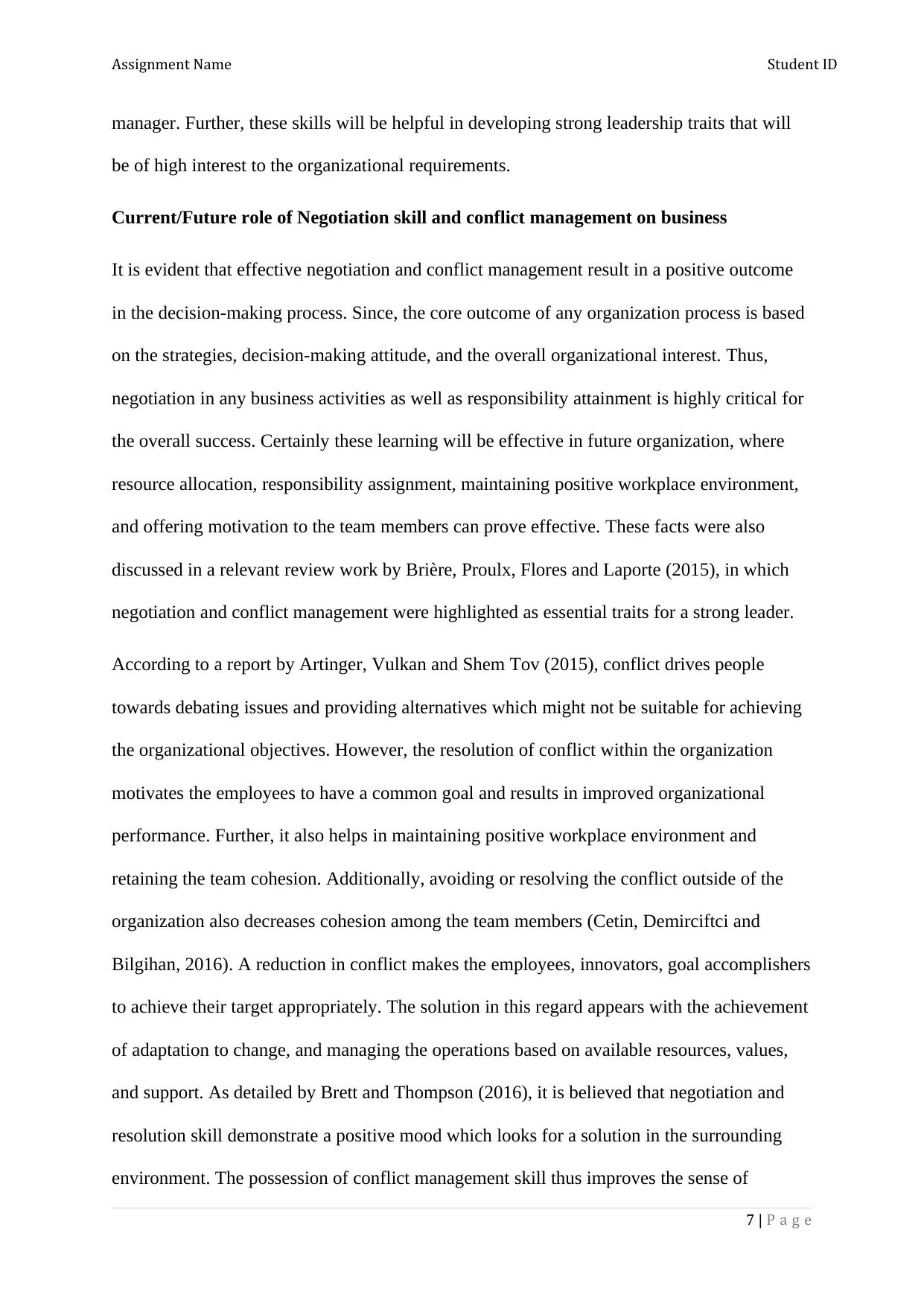
Assignment Name Student ID
manager. Further, these skills will be helpful in developing strong leadership traits that will
be of high interest to the organizational requirements.
Current/Future role of Negotiation skill and conflict management on business
It is evident that effective negotiation and conflict management result in a positive outcome
in the decision-making process. Since, the core outcome of any organization process is based
on the strategies, decision-making attitude, and the overall organizational interest. Thus,
negotiation in any business activities as well as responsibility attainment is highly critical for
the overall success. Certainly these learning will be effective in future organization, where
resource allocation, responsibility assignment, maintaining positive workplace environment,
and offering motivation to the team members can prove effective. These facts were also
discussed in a relevant review work by Brière, Proulx, Flores and Laporte (2015), in which
negotiation and conflict management were highlighted as essential traits for a strong leader.
According to a report by Artinger, Vulkan and Shem Tov (2015), conflict drives people
towards debating issues and providing alternatives which might not be suitable for achieving
the organizational objectives. However, the resolution of conflict within the organization
motivates the employees to have a common goal and results in improved organizational
performance. Further, it also helps in maintaining positive workplace environment and
retaining the team cohesion. Additionally, avoiding or resolving the conflict outside of the
organization also decreases cohesion among the team members (Cetin, Demirciftci and
Bilgihan, 2016). A reduction in conflict makes the employees, innovators, goal accomplishers
to achieve their target appropriately. The solution in this regard appears with the achievement
of adaptation to change, and managing the operations based on available resources, values,
and support. As detailed by Brett and Thompson (2016), it is believed that negotiation and
resolution skill demonstrate a positive mood which looks for a solution in the surrounding
environment. The possession of conflict management skill thus improves the sense of
7 | P a g e
manager. Further, these skills will be helpful in developing strong leadership traits that will
be of high interest to the organizational requirements.
Current/Future role of Negotiation skill and conflict management on business
It is evident that effective negotiation and conflict management result in a positive outcome
in the decision-making process. Since, the core outcome of any organization process is based
on the strategies, decision-making attitude, and the overall organizational interest. Thus,
negotiation in any business activities as well as responsibility attainment is highly critical for
the overall success. Certainly these learning will be effective in future organization, where
resource allocation, responsibility assignment, maintaining positive workplace environment,
and offering motivation to the team members can prove effective. These facts were also
discussed in a relevant review work by Brière, Proulx, Flores and Laporte (2015), in which
negotiation and conflict management were highlighted as essential traits for a strong leader.
According to a report by Artinger, Vulkan and Shem Tov (2015), conflict drives people
towards debating issues and providing alternatives which might not be suitable for achieving
the organizational objectives. However, the resolution of conflict within the organization
motivates the employees to have a common goal and results in improved organizational
performance. Further, it also helps in maintaining positive workplace environment and
retaining the team cohesion. Additionally, avoiding or resolving the conflict outside of the
organization also decreases cohesion among the team members (Cetin, Demirciftci and
Bilgihan, 2016). A reduction in conflict makes the employees, innovators, goal accomplishers
to achieve their target appropriately. The solution in this regard appears with the achievement
of adaptation to change, and managing the operations based on available resources, values,
and support. As detailed by Brett and Thompson (2016), it is believed that negotiation and
resolution skill demonstrate a positive mood which looks for a solution in the surrounding
environment. The possession of conflict management skill thus improves the sense of
7 | P a g e
Paraphrase This Document
Need a fresh take? Get an instant paraphrase of this document with our AI Paraphraser
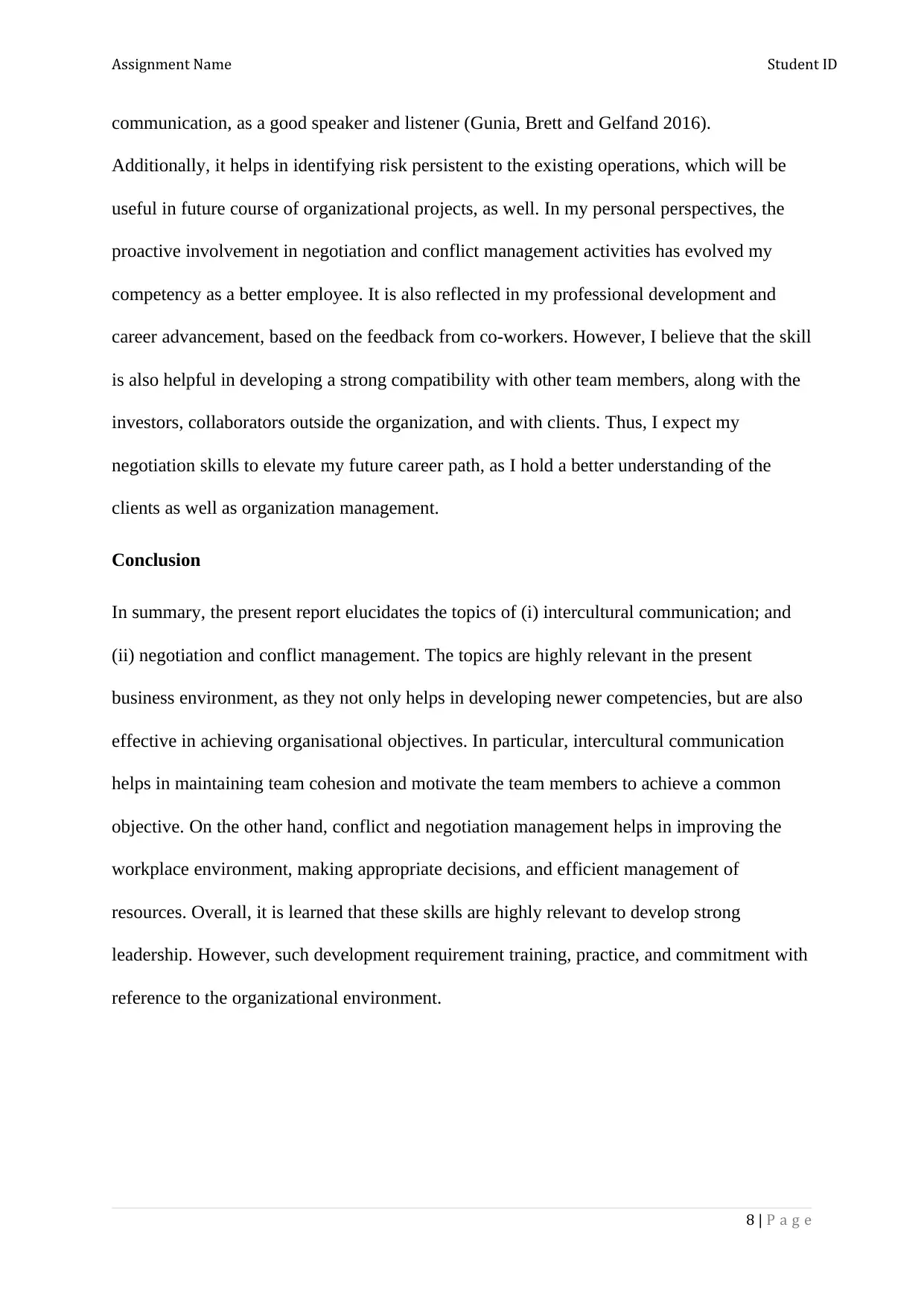
Assignment Name Student ID
communication, as a good speaker and listener (Gunia, Brett and Gelfand 2016).
Additionally, it helps in identifying risk persistent to the existing operations, which will be
useful in future course of organizational projects, as well. In my personal perspectives, the
proactive involvement in negotiation and conflict management activities has evolved my
competency as a better employee. It is also reflected in my professional development and
career advancement, based on the feedback from co-workers. However, I believe that the skill
is also helpful in developing a strong compatibility with other team members, along with the
investors, collaborators outside the organization, and with clients. Thus, I expect my
negotiation skills to elevate my future career path, as I hold a better understanding of the
clients as well as organization management.
Conclusion
In summary, the present report elucidates the topics of (i) intercultural communication; and
(ii) negotiation and conflict management. The topics are highly relevant in the present
business environment, as they not only helps in developing newer competencies, but are also
effective in achieving organisational objectives. In particular, intercultural communication
helps in maintaining team cohesion and motivate the team members to achieve a common
objective. On the other hand, conflict and negotiation management helps in improving the
workplace environment, making appropriate decisions, and efficient management of
resources. Overall, it is learned that these skills are highly relevant to develop strong
leadership. However, such development requirement training, practice, and commitment with
reference to the organizational environment.
8 | P a g e
communication, as a good speaker and listener (Gunia, Brett and Gelfand 2016).
Additionally, it helps in identifying risk persistent to the existing operations, which will be
useful in future course of organizational projects, as well. In my personal perspectives, the
proactive involvement in negotiation and conflict management activities has evolved my
competency as a better employee. It is also reflected in my professional development and
career advancement, based on the feedback from co-workers. However, I believe that the skill
is also helpful in developing a strong compatibility with other team members, along with the
investors, collaborators outside the organization, and with clients. Thus, I expect my
negotiation skills to elevate my future career path, as I hold a better understanding of the
clients as well as organization management.
Conclusion
In summary, the present report elucidates the topics of (i) intercultural communication; and
(ii) negotiation and conflict management. The topics are highly relevant in the present
business environment, as they not only helps in developing newer competencies, but are also
effective in achieving organisational objectives. In particular, intercultural communication
helps in maintaining team cohesion and motivate the team members to achieve a common
objective. On the other hand, conflict and negotiation management helps in improving the
workplace environment, making appropriate decisions, and efficient management of
resources. Overall, it is learned that these skills are highly relevant to develop strong
leadership. However, such development requirement training, practice, and commitment with
reference to the organizational environment.
8 | P a g e
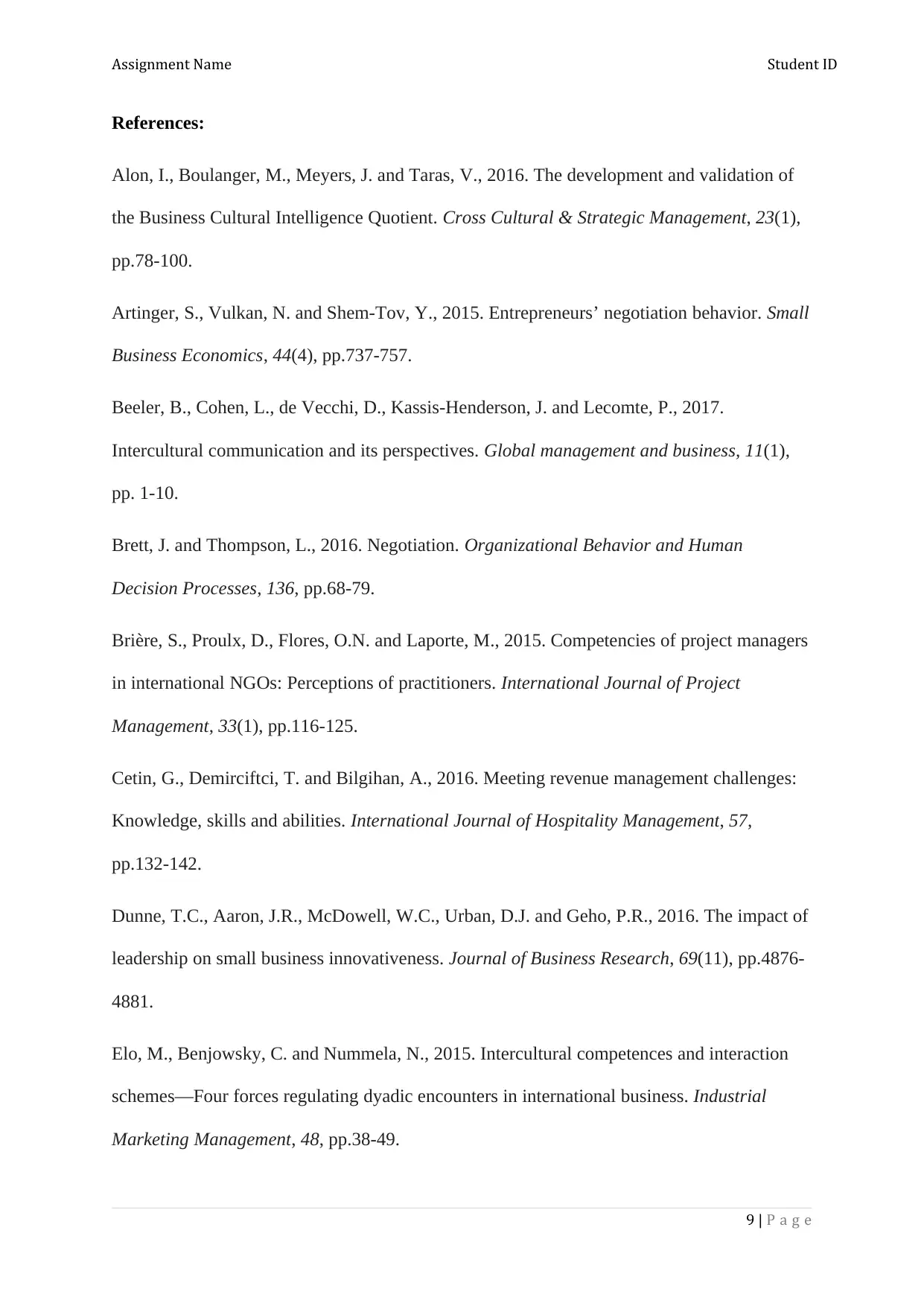
Assignment Name Student ID
References:
Alon, I., Boulanger, M., Meyers, J. and Taras, V., 2016. The development and validation of
the Business Cultural Intelligence Quotient. Cross Cultural & Strategic Management, 23(1),
pp.78-100.
Artinger, S., Vulkan, N. and Shem-Tov, Y., 2015. Entrepreneurs’ negotiation behavior. Small
Business Economics, 44(4), pp.737-757.
Beeler, B., Cohen, L., de Vecchi, D., Kassis-Henderson, J. and Lecomte, P., 2017.
Intercultural communication and its perspectives. Global management and business, 11(1),
pp. 1-10.
Brett, J. and Thompson, L., 2016. Negotiation. Organizational Behavior and Human
Decision Processes, 136, pp.68-79.
Brière, S., Proulx, D., Flores, O.N. and Laporte, M., 2015. Competencies of project managers
in international NGOs: Perceptions of practitioners. International Journal of Project
Management, 33(1), pp.116-125.
Cetin, G., Demirciftci, T. and Bilgihan, A., 2016. Meeting revenue management challenges:
Knowledge, skills and abilities. International Journal of Hospitality Management, 57,
pp.132-142.
Dunne, T.C., Aaron, J.R., McDowell, W.C., Urban, D.J. and Geho, P.R., 2016. The impact of
leadership on small business innovativeness. Journal of Business Research, 69(11), pp.4876-
4881.
Elo, M., Benjowsky, C. and Nummela, N., 2015. Intercultural competences and interaction
schemes—Four forces regulating dyadic encounters in international business. Industrial
Marketing Management, 48, pp.38-49.
9 | P a g e
References:
Alon, I., Boulanger, M., Meyers, J. and Taras, V., 2016. The development and validation of
the Business Cultural Intelligence Quotient. Cross Cultural & Strategic Management, 23(1),
pp.78-100.
Artinger, S., Vulkan, N. and Shem-Tov, Y., 2015. Entrepreneurs’ negotiation behavior. Small
Business Economics, 44(4), pp.737-757.
Beeler, B., Cohen, L., de Vecchi, D., Kassis-Henderson, J. and Lecomte, P., 2017.
Intercultural communication and its perspectives. Global management and business, 11(1),
pp. 1-10.
Brett, J. and Thompson, L., 2016. Negotiation. Organizational Behavior and Human
Decision Processes, 136, pp.68-79.
Brière, S., Proulx, D., Flores, O.N. and Laporte, M., 2015. Competencies of project managers
in international NGOs: Perceptions of practitioners. International Journal of Project
Management, 33(1), pp.116-125.
Cetin, G., Demirciftci, T. and Bilgihan, A., 2016. Meeting revenue management challenges:
Knowledge, skills and abilities. International Journal of Hospitality Management, 57,
pp.132-142.
Dunne, T.C., Aaron, J.R., McDowell, W.C., Urban, D.J. and Geho, P.R., 2016. The impact of
leadership on small business innovativeness. Journal of Business Research, 69(11), pp.4876-
4881.
Elo, M., Benjowsky, C. and Nummela, N., 2015. Intercultural competences and interaction
schemes—Four forces regulating dyadic encounters in international business. Industrial
Marketing Management, 48, pp.38-49.
9 | P a g e
⊘ This is a preview!⊘
Do you want full access?
Subscribe today to unlock all pages.

Trusted by 1+ million students worldwide
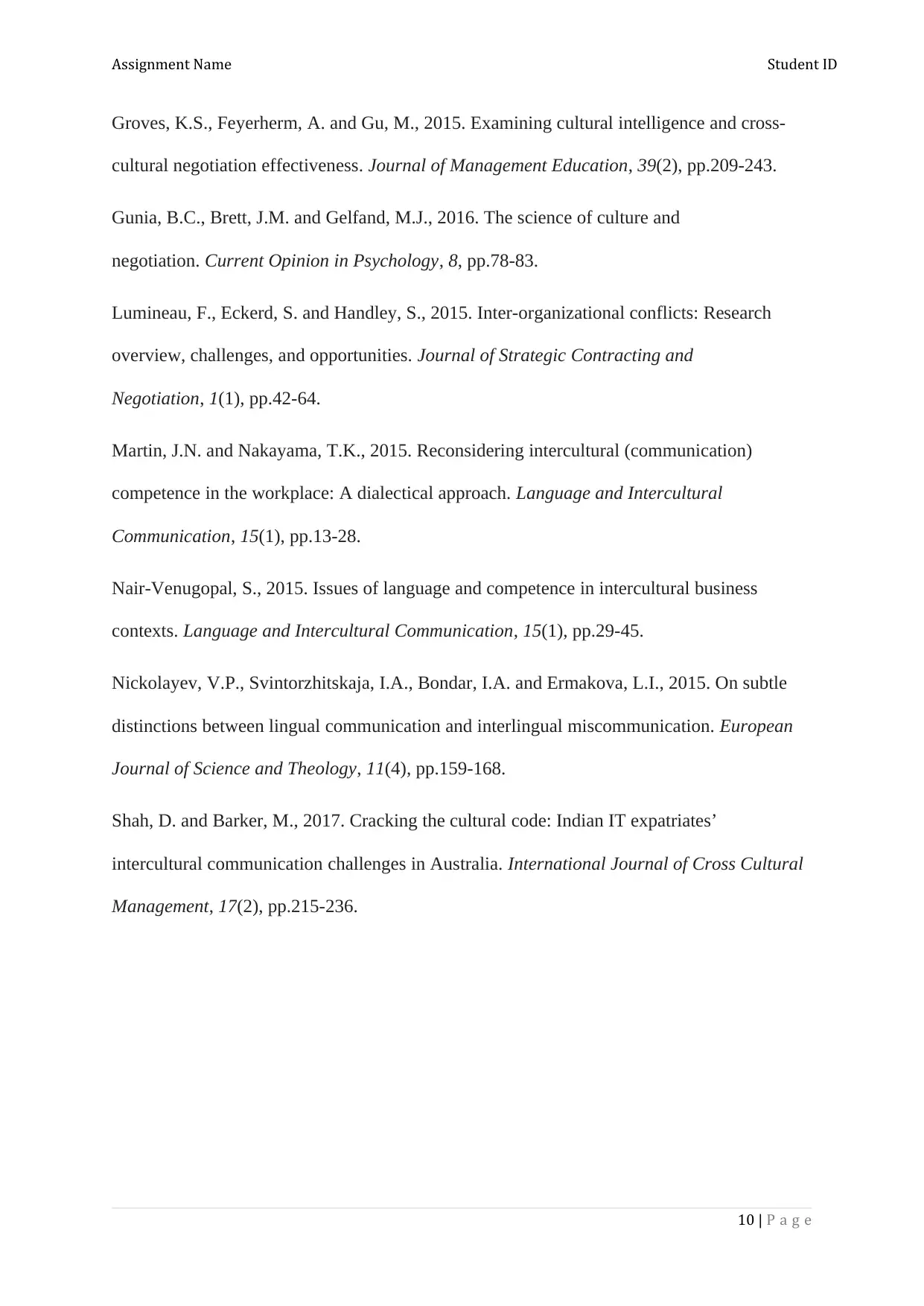
Assignment Name Student ID
Groves, K.S., Feyerherm, A. and Gu, M., 2015. Examining cultural intelligence and cross-
cultural negotiation effectiveness. Journal of Management Education, 39(2), pp.209-243.
Gunia, B.C., Brett, J.M. and Gelfand, M.J., 2016. The science of culture and
negotiation. Current Opinion in Psychology, 8, pp.78-83.
Lumineau, F., Eckerd, S. and Handley, S., 2015. Inter-organizational conflicts: Research
overview, challenges, and opportunities. Journal of Strategic Contracting and
Negotiation, 1(1), pp.42-64.
Martin, J.N. and Nakayama, T.K., 2015. Reconsidering intercultural (communication)
competence in the workplace: A dialectical approach. Language and Intercultural
Communication, 15(1), pp.13-28.
Nair-Venugopal, S., 2015. Issues of language and competence in intercultural business
contexts. Language and Intercultural Communication, 15(1), pp.29-45.
Nickolayev, V.P., Svintorzhitskaja, I.A., Bondar, I.A. and Ermakova, L.I., 2015. On subtle
distinctions between lingual communication and interlingual miscommunication. European
Journal of Science and Theology, 11(4), pp.159-168.
Shah, D. and Barker, M., 2017. Cracking the cultural code: Indian IT expatriates’
intercultural communication challenges in Australia. International Journal of Cross Cultural
Management, 17(2), pp.215-236.
10 | P a g e
Groves, K.S., Feyerherm, A. and Gu, M., 2015. Examining cultural intelligence and cross-
cultural negotiation effectiveness. Journal of Management Education, 39(2), pp.209-243.
Gunia, B.C., Brett, J.M. and Gelfand, M.J., 2016. The science of culture and
negotiation. Current Opinion in Psychology, 8, pp.78-83.
Lumineau, F., Eckerd, S. and Handley, S., 2015. Inter-organizational conflicts: Research
overview, challenges, and opportunities. Journal of Strategic Contracting and
Negotiation, 1(1), pp.42-64.
Martin, J.N. and Nakayama, T.K., 2015. Reconsidering intercultural (communication)
competence in the workplace: A dialectical approach. Language and Intercultural
Communication, 15(1), pp.13-28.
Nair-Venugopal, S., 2015. Issues of language and competence in intercultural business
contexts. Language and Intercultural Communication, 15(1), pp.29-45.
Nickolayev, V.P., Svintorzhitskaja, I.A., Bondar, I.A. and Ermakova, L.I., 2015. On subtle
distinctions between lingual communication and interlingual miscommunication. European
Journal of Science and Theology, 11(4), pp.159-168.
Shah, D. and Barker, M., 2017. Cracking the cultural code: Indian IT expatriates’
intercultural communication challenges in Australia. International Journal of Cross Cultural
Management, 17(2), pp.215-236.
10 | P a g e
1 out of 10
Related Documents
Your All-in-One AI-Powered Toolkit for Academic Success.
+13062052269
info@desklib.com
Available 24*7 on WhatsApp / Email
![[object Object]](/_next/static/media/star-bottom.7253800d.svg)
Unlock your academic potential
Copyright © 2020–2026 A2Z Services. All Rights Reserved. Developed and managed by ZUCOL.





